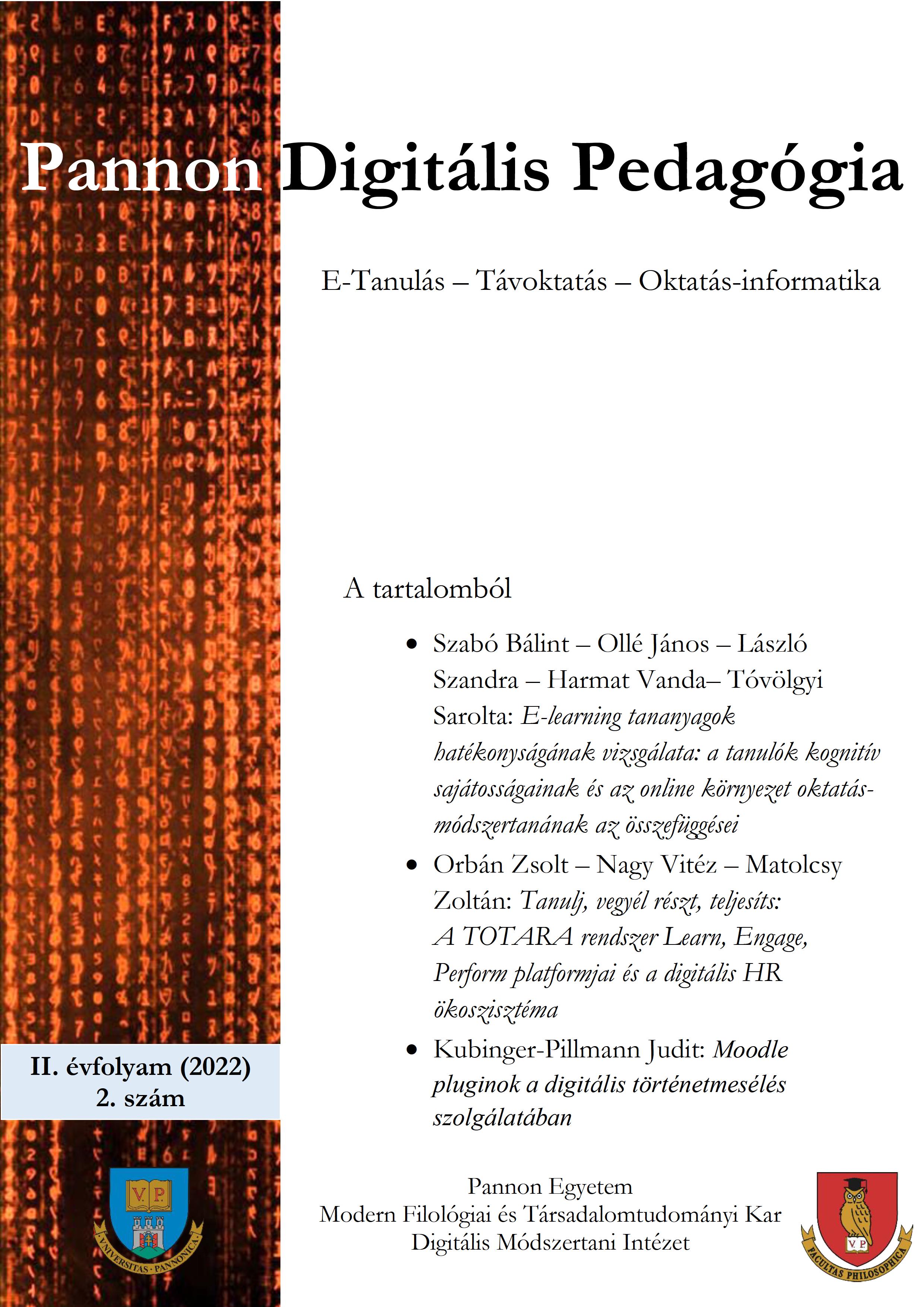Környezetvédelmi szempontok érvényesítése a turisztikai fejlesztésekben tanulási környezet és érzékenyítő digitális tananyag fejlesztése
DOI:
https://doi.org/10.56665/PADIPE.2022.2.4Keywords:
E-learning, sensetising curriculum, flipped classroom, change of attitude, environmentAbstract
Today, the infocommunication revolution is forcing amazing paradigm shifts in all areas of life. Education is not an exception. In their approach, values and attitude ‘brand new’ young people are knocking on the gates of the school, with changed expectations towards education. An important topic in development purposes is the use of electronic devices by our students, its direction and depth, and the change in their learning environment, which poses new challenges to the teacher community. What kind of tools do our students have? What do they use them for? Do they know the software we can use to digitize the educational process? Is the pedagogical society prepared for such a level of change? - For now, there are more questions than answers. The focus of my work is on the possibilities of linking vocational training and e-learning.
Knowing the daily ‘treadmill’, the current curricula and number of classes, we can state that the elements of
digital curriculum can be well integrated into the process of learning and practicing educational materials, but it is
impossible to change teaching to E-learning in the current circumstances. In my dissertation, I worked on the development of a curriculum in a Moodle environment, - unique in our school-, which will allow my tourism students to broaden their perspectives on the positive and negative effects of hotel investments. The E-learning curriculum identifies the environment of a hotel development. It also presents the positive effects of the investment, as well as the environmental aspects that may prompt us to make significant changes or abandon the project. The curriculum is mastered after class preparation in a ‘flipped classroom’ and then the experience is discussed at the next meeting strengthening the sensitivity to the topic. By the end of the training, I would like to achieve that a generation of environmentally sensitive professionals focusing on sustainability will get to their workplaces.
References
DRIPPEY-DÉVAI Julianna (2019): Érzékenyítés és szemléletformálás az iskolában – egy jó hazai gyakorlat https://mindsetpszichologia.hu/erzekenyites-es-szemleletformalas-az-iskolaban-egy-jo-hazai-gyakorlat Letöltés dátuma: 2021.12.27.
EURÓPAI UNIÓ PARLAMENTJE (2021): Az Európai Parlament 2021. március 25-i állásfoglalása „A fenntartható turizmusra vonatkozó uniós stratégia létrehozása” témájáról. https://bit.ly/31sCAgA Letöltés dátuma: 2021.12.30.
Fenntartható turizmus – A gyenesdiási modell (2007). Turizmus Trend. https://bit.ly/32UC1wl Letöltés dátuma: 2021.12.30.
Fenntartható turizmus hálózatosodás és együttműködések kialakításával. 1. Modul. Fenntartható menedzsment a turisztikai szektorban. – Sustain T 2017-1-ESO1-KA202-038128. 2017. https://bit.ly/3ES9O6M Letöltés dátuma: 2021.12.29.
HAPP Éva (2014): Fenntartható turizmus és felelősségvállalás = Gazdaság & Társadalom 6. év., 1. sz. https://bit.ly/3mVdT3Z Letöltés dátuma: 2021.12.30.
HUJBER Tamásné (2018): Módszertani segédanyag érzékenyítő foglalkozásokhoz. Kaposvár, ALTERNATÍVA Komplex Szolgáltató Egyesület. 3E projekt (esélyteremtés – érzékenyítés – együttműködés) FOF2017/63.
KATHÁZ KÖZHASZNÚ NONPROFIT KFT. (SZEGED) SZAKMAI CSOPORTJA. (2015): Módszertani segédletek. Erasmus Plus Stratégiai partnerség a szociális érzékenység fejlesztéséért 1-HU01KA201-013623. https://bit.ly/3eNsOIT Letöltés dátuma: 2021.12.29.
Kézikönyv a fenntartható turizmus jó gyakorlatáról a védett területeken (2018). [hn.] Central Europe EcoTourism. https://bit.ly/3JCOC8i Letöltés dátuma: 2022.01.03. Letöltés dátuma: 2022.01.02. https://bit.ly/3mRG4k8
MEGGYESNÉ HOSSZU Tímea – MÁTÉNÉ HOMOKI Tünde (2013): A társadalmi érzékenyítés módszertana kisgyermekkorban I „Mentor(h)áló 2.0 Program” TÁMOP-4.1.2.B.2-13/1-2013-0008 projekt. https://bit.ly/3mY224W Letöltés dátuma: 2021.12.27.
OLLÉ János – KOCSIS Ágnes – MOLNÁR Előd – SABLIK Henrik – PÁPAI Anna – FARAGÓ Boglárka (2016): Oktatástervezés, digitális tartalomfejlesztés. Eger, Líceum.
SZERDAHELYI Krisztina (2019): Ahol a fenntarthatóság is élményelem. – Turizmus online. https://bit.ly/3mQLjAH Letöltés dátuma: 2021.12.30.
Downloads
Published
Versions
- 2023-01-16 (2)
- 2022-12-24 (1)

